As a dog owner, there’s no doubt that you’ve been curious about what human foods are safe to share with your beloved canine companion. After all, those puppy-dog eyes can be incredibly hard to resist, and you may find yourself wondering if your furry friend can indulge in some of your favorite snacks.
However, when it comes to certain foods, like grapes, it’s essential to know that not all human delicacies are suitable for our four-legged friends.
The question of whether dogs can eat grapes has sparked much debate and concern among pet owners and veterinarians alike. For years, grapes and their dried counterparts, raisins, have been considered a potential health risk for dogs, but the reasons behind this caution have not always been clear.
In this comprehensive guide, we aim to shed light on the grape and dog connection, exploring the science and facts surrounding this issue to keep your furry friend safe and healthy.
Join us as we navigate through the fascinating world of canine nutrition, toxicity risks, and how to be a responsible pet owner when it comes to sharing food with your furry family member.
Whether you’ve unknowingly slipped your pup a grape or simply want to be well-informed to protect their well-being, this article will provide you with the knowledge and insight you need.
So, let’s delve into the grape debate and discover why this seemingly innocent fruit can pose a significant threat to our canine companions. Remember, knowledge is power, and by the end of this read, you’ll be equipped with the tools to make informed decisions and ensure your dog’s health and happiness are always a top priority.
Why Are Grapes Toxic to Dogs?
Grape toxicity is a serious condition that affects dogs of all breeds, ages, and genders. The exact cause of grape toxicity is unknown, but researchers suspect that it has something to do with a substance in grapes that dogs cannot metabolize. This substance may be tannins, flavonoids, monosaccharides, or something else.
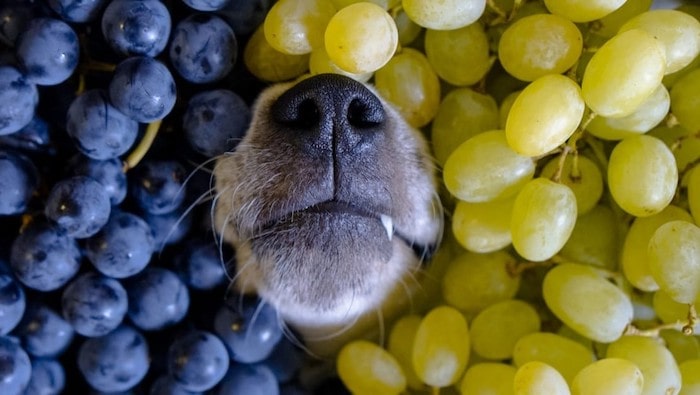
According to the ASPCA Animal Poison Control Center (APCC), grapes and raisins are among the top 10 most common causes of poisoning in dogs. In 2019 alone, the APCC received 3,722 calls related to grape and raisin ingestion by dogs.
The severity of grape poisoning depends on several factors, such as:
- The amount of grapes or raisins ingested
- The size and weight of the dog
- The time elapsed since ingestion
- The individual sensitivity of the dog
There is no safe amount of grapes or raisins for dogs to eat. Even a small amount can be fatal for some dogs. For example, one study reported that a 9 kg (20 lb) dog developed signs of kidney failure after eating only four or five grapes.
The best way to avoid grape poisoning in dogs is to never feed them grapes or raisins or any food products that contain them.
How Many Grapes Can Harm a Dog?
There is no safe amount of grapes or raisins for dogs to eat. Even a small amount can be enough to cause serious problems. The toxicity level varies from dog to dog, but as a general rule, the lower the dose, the better the prognosis.
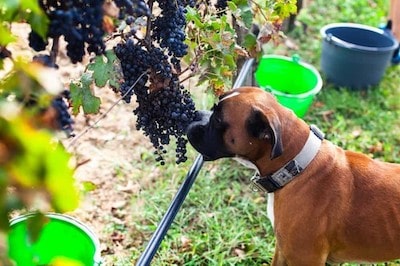
According to PetMD, as little as 0.3 ounces of grapes per pound of body weight can cause symptoms of grape toxicity in dogs. For example, a 10-pound dog could get sick from eating as few as three grapes, while a 50-pound dog could get sick from eating about 15 grapes.
However, some dogs may not show any symptoms until they eat much more than that. Therefore, it is best to avoid giving any grapes or raisins to your
Symptoms of Grape Poisoning in Dogs
The symptoms of grape poisoning in dogs can vary depending on the amount ingested, the time elapsed since ingestion, and the individual dog’s sensitivity. However, some common signs to look out for are[1]:
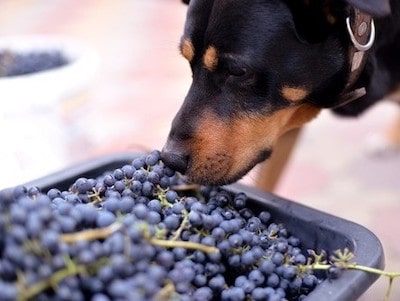
- Vomiting
- Diarrhea
- Loss of appetite
- Lethargy
- Weakness
- Abdominal pain
- Increased thirst
- Increased or decreased urination
- Dehydration
- Mouth ulcers
- Seizures
- Coma
The symptoms usually appear within 24 hours of ingestion, but they can be delayed for up to 72 hours. The most severe sign of grape toxicity is kidney failure, which can occur within 48 hours of ingestion. Kidney failure can cause irreversible damage to the dog’s organs and lead to death.
Treatment of Grape Poisoning in Dogs
Grape poisoning is a medical emergency that requires prompt treatment. The sooner you take your dog to the vet, the better the chances of recovery.
“The goal of treatment is to block absorption of the toxins and prevent or minimize damage to the kidneys”, suggest Renee Schmid, DVM, from VCA Hospitals.
The treatment of grape poisoning may include:
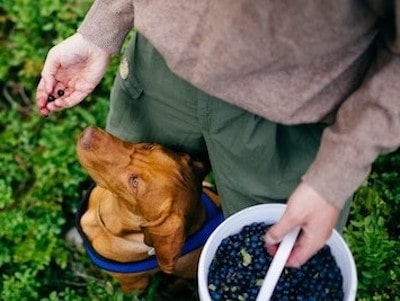
- Inducing vomiting: This can help remove some of the grapes from your dog’s stomach if done within two hours of ingestion. However, you should not induce vomiting at home without consulting your vet first, as it may be contraindicated in some cases.
- Administering activated charcoal: This can help reduce the absorption of toxins from the intestines into the bloodstream.
- Performing gastric lavage: This is a procedure where a tube is inserted through your dog’s mouth into the stomach and fluid is pumped in and out to wash out the contents. This can only be done by a vet under anesthesia.
- Giving intravenous fluids: This can help flush out the toxins from your dog’s kidneys and prevent dehydration.
- Giving diuretics: These are drugs that increase urine output and help eliminate toxins from your dog’s body.
- Performing dialysis: This is a process where a machine filters your dog’s blood and removes waste products and excess fluids. This can be done if your dog’s kidneys are severely damaged or not functioning at all.
- Performing kidney transplant: This is a surgery where a healthy kidney from a donor is transplanted into your dog’s body. This can be done if your dog’s kidneys are irreversibly damaged.
The prognosis and recovery time for dogs with grape poisoning vary depending on the severity of the condition and the treatment given. Some dogs may recover fully, while others may have permanent kidney damage or die.
How to Prevent Grape Poisoning in Dogs?
The best way to prevent grape poisoning in dogs[2] is to keep grapes and raisins away from your dog at all times. Here are some tips to help you do that:
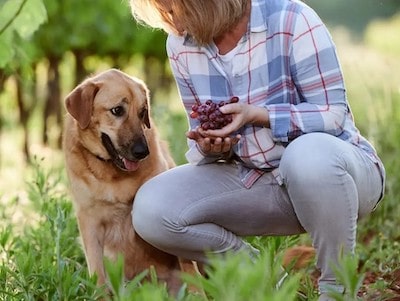
- Store grapes and raisins in sealed containers and out of your dog’s reach.
- Dispose of grape stems, peels, and seeds properly and securely.
- Educate your children and guests about the dangers of feeding grapes or raisins to your dog.
- Do not leave grapes or raisins on the counter, table, or floor where your dog can access them.
- Check the ingredients of any food products or treats that you give to your dog and make sure they do not contain grapes or raisins.
- If you grow grapes in your garden, fence off the area or keep your dog away from it.
FAQs
Are all dog breeds equally affected by grape toxicity?
While grape toxicity is a concern for all dog breeds, it’s worth noting that some dogs may be more susceptible to the harmful effects of grapes than others. However, it’s challenging to predict which dogs are at higher risk, so all dogs should avoid grapes as a precaution.
Can a single grape be dangerous for a dog?
Yes, even a single grape can be toxic to certain dogs. The toxic substance in grapes can have a potent effect on a dog’s kidneys, regardless of the amount consumed.
Is grape seed extract safe for dogs?
Grape seed extract should also be avoided, as it may contain similar harmful substances found in grapes and can pose a risk to dogs.
Are there any safe alternatives to grapes as dog treats?
Yes, many fruits and vegetables make safe and healthy treats for dogs. Some suitable alternatives include apple slices, carrots, blueberries, and watermelon (without seeds). Always introduce new foods gradually and in moderation.
Well, That’s a Wrap
Grapes are a toxic fruit for dogs and can cause serious health problems, even death. There is no safe amount of grapes or raisins for dogs to eat, and the symptoms of grape poisoning can vary from mild to severe. If your dog eats grapes or raisins, you should contact your veterinarian immediately and follow their instructions.
However, there are many other fruits that are safe and healthy for dogs to eat, such as apples, bananas, blueberries, watermelon, pears, mango, nectarine, and orange. These fruits have antioxidants, fiber, vitamins, and minerals that are good for dogs. However, you should always give them in moderation and remove any peels, seeds, or stones that can be harmful or cause intestinal obstruction.
Fruits can be a great treat for dogs, but only if they are dog-safe and given in appropriate amounts. Always consult your veterinarian before introducing new foods to your dog’s diet and monitor your dog for any adverse reactions. Remember, what is good for you may not be good for your dog.
Reference:
- Loesch, S. A. (2015, October 22). Just How Dangerous are Grapes for Dogs? | SiOWfa15: Science in Our World: Certainty and Controversy. Retrieved August 3, 2023, from PSU.Edu
- Cortinovis, C., & Caloni, F. (2016). Household food items toxic to dogs and cats. Frontiers in Veterinary Science, 3. Frontiers

Robert is the heart of Dog Needs Best, with his cheerful personality he is not only beloved by our team but also by dogs. He owns multiple dogs and knows ins and outs of them. Finding the perfect product is what he is best at!

